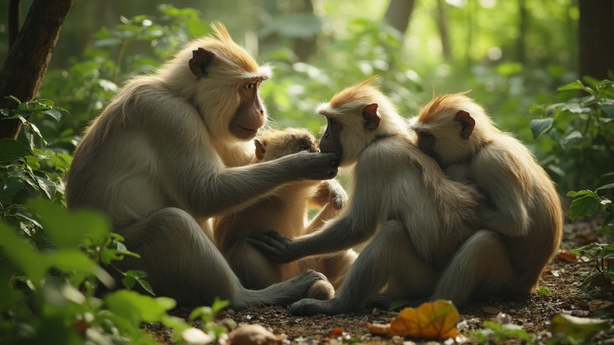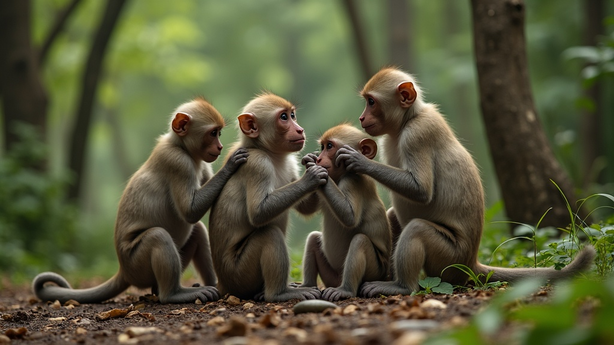"`html
Monkeys' survival instincts and social interactions play a crucial role in protecting their lives and maintaining social membership. They possess a variety of instincts for survival in nature, which enable them to find food and defend themselves against predators. Furthermore, monkeys communicate with each other through complex social structures and maintain balance within the group.
The monkey's survival instinct
Monkeys exhibit a variety of instinctive behaviors to ensure their survival. They avoid conflict with predators and employ complex strategies to obtain food. For example, they move only during certain times of the day and often stay in treetops, where they are less exposed to predators.
This survival instinct manifests itself in various defense mechanisms depending on the species. The main defense mechanisms observed in monkeys include:
- Maintain alert
- Warnings through voice and signals
- Group defensive behavior
- Escape using speed and agility
- Cooperation through communication
Different species of monkeys adapt their survival strategies based on these instincts. This allows them to thrive in rapidly changing environments. The survival instincts and behaviors of monkeys are diverse and complex, and many researchers are pursuing this fascinating topic.

Social interaction in monkeys
“`
"`html
Monkeys' social interactions manifest in a variety of ways. They have evolved communication to acknowledge each other and maintain social structures. For example, monkeys communicate with each other through various sounds, gestures, and facial expressions, thereby maintaining order within the group. These social interactions play a crucial role in the survival of monkeys, and each group has a distinct hierarchy and rules.
Social behavior and structure of monkeys
Monkeys strengthen social bonds and cooperation through social behavior. They cooperate to achieve common goals and tend to resolve internal conflicts peacefully when they arise. These social behaviors solidify the monkeys' social structure and maintain peace within the group. Furthermore, social interaction stimulates the nervous system and provides opportunities for learning, fostering social evolution alongside survival instincts.
Within their social structure, monkeys maintain a certain hierarchy, which significantly influences decision-making and resource allocation within the group. Each group operates in an organized manner, with its own unique rules and division of roles. This allows monkeys to survive and adapt to complex social environments.

Ecological Roles and Environmental Contributions of Monkeys
Monkeys make important contributions to the ecosystem through their survival instincts and social interactions. They primarily play a role in maintaining the balance of forest ecosystems through seed dispersal. Their feeding habits play a crucial role in promoting ecosystem diversity and resilience. Interactions with other animal species have a positive impact on the environment, and thus their presence contributes to the sustainability of the ecosystem.
In the long run, monkeys promote biodiversity and influence the habitat choices of other species through their unique behaviors. Thus, monkeys' survival instincts and social interactions go beyond mere self-preservation; they play a vital role in sustaining the ecosystem.
“`
"`html
Advanced Uses of the Monkey's Survival Instinct
Monkeys' survival instincts are crucial tools for adapting to environmental changes, such as climate change and habitat fragmentation. They can survive in extreme environments by diversifying their foraging strategies. For example, certain species of monkeys primarily consume leaves from tropical forests, but they demonstrate the flexibility to expand their diet when climate change occurs. This diversity maximizes their survival rate, enabling them to adapt appropriately to unpredictable situations. Furthermore, monkeys use this diversity to alter their interactions with other organisms, contributing to a more stable ecosystem.
The monkeys' defense mechanisms are also crucial, and their defensive behaviors can take many forms. They use agile evasion strategies to avoid predators, or they use threatening antics and communication to escape crises. Even in coexistence with humans, the monkeys' survival instinct allows them to quickly understand and adapt to new habitats and environmental conditions, enabling them to successfully establish themselves in various environments.
Conclusion and wrap-up
Monkeys' survival instincts and social interactions enable them to play a vital role in the ecosystem. They excel at finding food and defending against predators, and their social structure maintains stability. These traits help them adapt quickly to environmental changes. A deep understanding of monkeys' survival instincts and social interactions is essential for developing strategies to conserve them. Readers, you can make a significant difference by raising awareness of our environment and taking steps to protect nature in a sustainable manner. Take action now.
“`